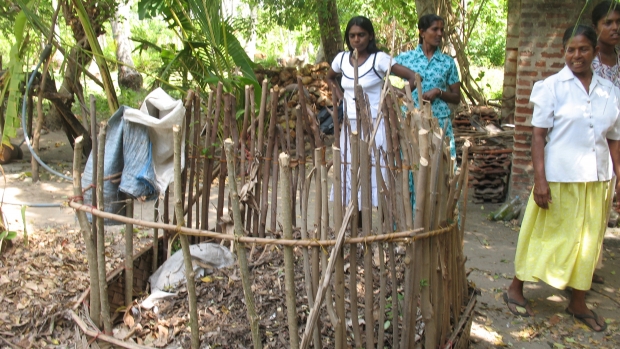Grants :: Small Grant Facilities :: Replanting mangroves and introducing eco-friendly home gardening
Replanting mangroves and introducing eco-friendly home gardening

Compost preparation Puttalam , Sri Lanka © KEkaratne , 2009
Objectives
This project sought to conserve the mangrove environment of Kalpitiya and develop agricultural practices such as home gardening.
Background
The area around Kalpitiya lagoon, which lies next to Puttalam lagoon, is characterised by shallow water tables and permeable soils prone to leaching. These make its groundwater particularly vulnerable to contamination from the chemicals used in farming. Further, high rates of soil erosion cause sedimentation of silt in the lagoon’s mangrove ecosystem. Together, soil erosion and excessive use of chemicals have led to groundwater pollution and degradation of mangrove ecosystems in the area.
Target beneficiaries
Thirty men and women of the communities in Kalpitiya.
Outputs
- Local group building and capacity development.
- Creation of environmental awareness.
- Establishment of 30 home gardens.
- Provision of training in composting.
- Demonstration of soil conservation methods.
- Establishment and maintenance of a mangrove nursery.
- Establishment of wind breaks and live fences.
- Mounting of a drawing exhibition.
- Monitoring and evaluation of home gardens, fruit plants and trees
- Replanting of mangroves on a 0.4-hectare area using 2,000 plants of Rhizophora sp. and two other species.
Accomplishments and challenges
As a result of the project, the fishing communities in Kalpitiya are more aware of the importance of the mangroves. Their community network has been strengthened, enhancing sharing of knowledge among villagers. A mangrove nursery was successfully established to supply replanting, and will continue to be maintained. Encouraged by the positive results and benefits of home gardening, project beneficiaries have been motivated to adopt it as an additional source of food and income.
Challenges
One drawback of the project was a lack of participation. Another was the lack of mangrove maps and related information, which hindered implementation of mangrove replanting and the nursery programme. A severe drought lasting 5–6 months also delayed mangrove replanting and planting of home gardens, and limited watering of crops.
Contributions to cross-cutting themes
Communications and gender equality
The project mounted a drawing exhibition to create environmental awareness, and sought to involve both women and men in its activities.
Lessons Learned
Mapping and planning of destroyed or degraded mangrove areas are needed to support any replanting programme, and constant awareness-raising efforts are needed to instil local appreciation of the importance of mangroves.
Successes were achieved in two main areas. First, the target communities developed an interest and desire in protecting the mangrove ecosystem. Second, the project introduced the communities to home gardening as an alternative means of providing food and cash income.
The activities started by the project have now been integrated with a larger agricultural development programme, helping to support the planning, implementation and monitoring that will ensure their long-term sustainability.
Project Facts
Country
Location
Puttalam, Sri Lanka
Topic
- Strategies for Management
- Sustainable Livelihoods
- Gender equality
- Knowledge management and communications
Duration
1st Jan 2009 to 31st Dec 2009
MFF Grant Amount
US$3,904
Implementing Partner
Sewalanka Foundation
432A, 2nd Floor, Colombo Road,
Boralasgamuwa,
Sri Lanka
Tel: +94 47 5675614
